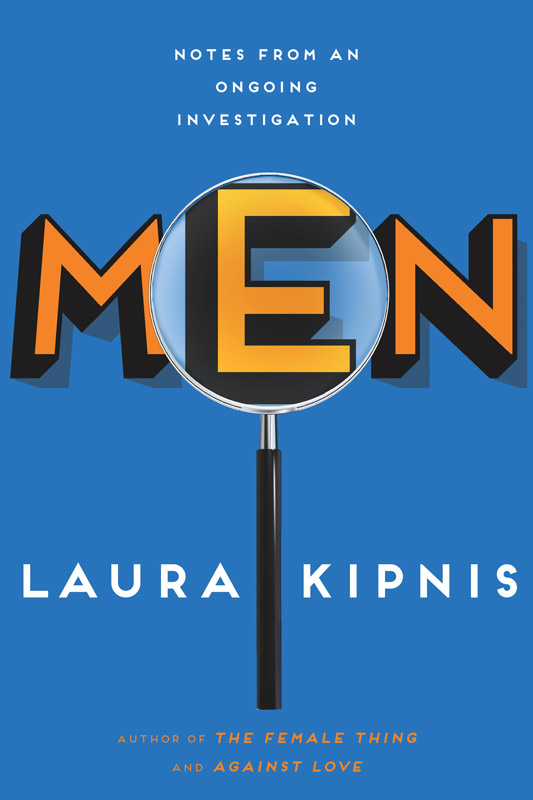
Men--Notes from an Ongoing Investigation
کتاب های مرتبط
- اطلاعات
- نقد و بررسی
- دیدگاه کاربران
نقد و بررسی

Starred review from July 14, 2014
Kipnis’s gifts are on full display in this irresistible collection of essays, in which she weaves together complex and penetrating insights about gender into provocative treatises. Though the book is putatively about men, Northwestern University professor Kipnis (Against Love) takes an appreciably unique angle on her subjects. Each chapter, save one, is devoted to an archetype of masculinity. Kipnis’s arguments are never predictable: for example, her chapter on “juicers,” ostensibly about steroid-abusing male athletes, evolves into a profound soliloquy about writing, plagiarism, and labor markets. Her examination of modern manhood sheds as much light on male vulnerability as it does on male privilege, entitlement, and abuse. If the book has a failing, it can be found in its unfortunate proclivity for armchair psychoanalysis, on display in the digression about Naomi Wolf’s story of sexual harassment at the hands of a male professor and the tale of a male writer who was the victim of stalking. In spite of this drawback, Kipnis has given us a necessary, and often witty, book that shows a brilliant, agile mind at work. Agent: PJ Mark, Janklow & Nesbit.

July 15, 2014
Feisty, unapologetic forays into the messiness of genderrelations.In these essays, most previously published, outspokenfeminist Kipnis (Radio/TV/Film/Northwestern Univ.; How to Become aScandal: Adventures in Bad Behavior, 2010, etc.) fashions a fittingcompanion to her previous, self-described "conflicted" work onfemininity, The Female Thing (2006). Male types-e.g., "the ConMan," "the Manly Man"-fascinate the author and offer a way inside the malepsyche in order to find out what men really think of women-and why we shouldcare. Refreshingly, Kipnis operates by plunging into her subject, getting herhands dirty, her critics be damned-for example, reading back issues of Hustler magazinebefore interviewing publisher Larry Flynt-"the Scumbag"-which director MilosForeman would not do when he made his film The People vs. Larry Flynt.Declaring the contents of the porn rag downright "Rabelaisian," however gross, Kipnis offers some admiration that Flynt built his empire from the idea offighting sexual repression. The author provides lively examples for each of her"types": "Humiliation Artists," like recently disgraced politician AnthonyWeiner, are really all variations of the eponymous shame-seeking hero of PhilipRoth's Portnoy's Complaint. "Cheaters," like Tiger Woods, can onlyoperate successfully due to the phalanx of women who possess "willingself-abnegation." "The Trespasser" of Jackie Onassis' privacy, photographer RonGalella, is now elevated as an "artist," and his aggressive stalking of hismuse has been airbrushed. Kipnis reserves the final section for "Haters,"namely critics like Dale Peck, right-wing biographers of Hillary Clinton and even radicalfeminist icon Andrea Dworkin. Unafraid of offending the cause of politicalcorrectness, Kipnis is the kind of unfettered, freethinking observer who evenquestioned the nature of "unwanted sexual advances" at her school's harassmentworkshop: "But how do you know they're unwanted until youtry?"Dynamite examples rendered in funny, spirited writing.
COPYRIGHT(2014) Kirkus Reviews, ALL RIGHTS RESERVED.

October 15, 2014
The latest collection of essays by self-described contrarian Kipnis (radio, television, film, Northwestern Univ.; The Female Thing) takes as its organizing principle both specific men (e.g. Larry Flynt, male biographers of Hillary Clinton) and more conceptual themes of maleness and masculinity. Divided into four broad sections, "Operators," "Neurotics," "Sex Fiends," and "Haters," each chapter is given an archetypal title, including "The Con Man," "The Manly Man," and "The Critic." Readers with a less categorical conception of gender, or less heteronormative view of the world, may be annoyed by Kipnis's tendency to make sweeping claims about men and gender, as well as her habit of speaking on behalf of women generally rather than herself specifically. Her performance will also not be to all readers' taste; Kipnis writes with the air of a rebellious, well-read teenager--employing a great deal of wit within which one finds little of original substance or firm conviction. First written as stand-alone pieces, taken together these essays can feel overwhelming in their ironic distance. VERDICT Despite these limitations, this work will likely be enjoyed and argued with in equal measure by feminist-minded individuals looking for a pleasurable read to tuck in their carry-on. [See Prepub Alert, 6/2/14.]--Anna J. Clutterbuck-Cook, Massachusetts Historical Soc. Lib., Boston
Copyright 2014 Library Journal, LLC Used with permission.

October 1, 2014
Men. Why does that one word so often seem to require a string of exclamation points or, at the very least, a little frowny face emoticon in its wake? What is it about the gender that produces such visceral reactions of frustration, disgust, vexation, and grief? And are we seeing a new, disturbing trend of increasingly outlandish behavior, especially on the part of public figures, or is this merely a case of boys will be boys taken to a twenty-first-century, ubiquitous social media level? Acerbic critic and audacious cultural commentator Kipnis follows The Female Thing (2006) with this piercing look at the more egregious forms of male behavior, from the serial philanderer to the charming con man, from the predatory professor to the political misogynist, to determine why men seem to be self-assuredly self-destructing in such flagrantly public and unapologetic ways. From Hustler's Larry Flynt to urbane philosopher Harvey Mansfield, Kipnis not only cleverly juxtaposes those who represent the extremes in pernicious conduct, she also sharply positions such manifestations of the eternal battle of the sexes in ambitious and explosive ways.(Reprinted with permission of Booklist, copyright 2014, American Library Association.)

























دیدگاه کاربران